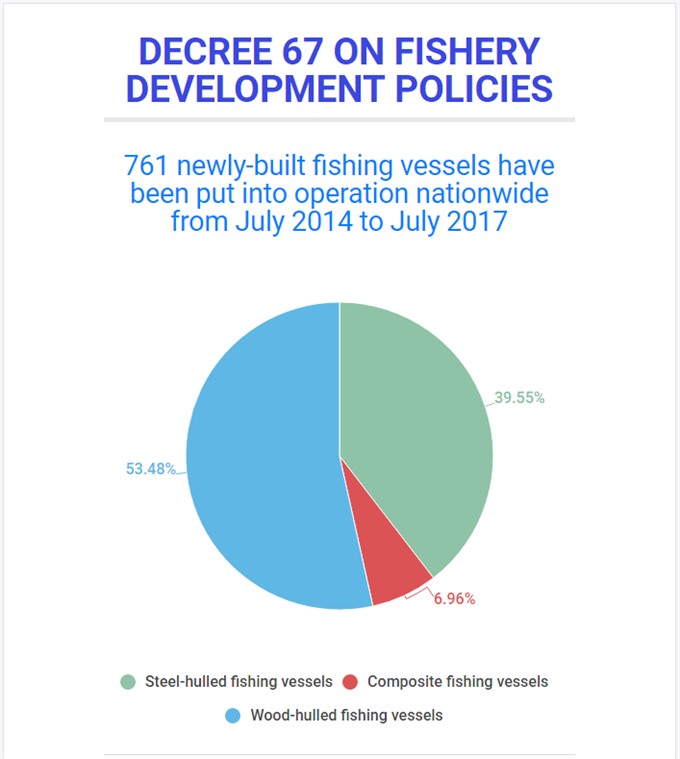 Society
Society

High interest rates and complicated lending procedures. Degrading port infrastructure. Fishing vessels that were new just a few years ago now broken and unusable. These are just a few of the problems fishermen highlighted yesterday at a conference on Decree 67 in central Đà Nẵng City.
 |
| VNS Infographic |
ĐÀ NẴNG – Interest rates are high whilst lending procedures complicated. Port infrastructure is degrading. Fishing vessels that were new just a few years ago are now broken and unusable.
These are just a few of the problems highlighted yesterday at a conference on Decree 67 in central Đà Nẵng City. Issued in 2014, Decree 67 aims to support fishermen and fisheries development by providing financial support for fishermen to purchase or build larger boats. With easier access to credit, the thinking went, fishermen could expand their capacity and their incomes. But as the discussion at the conference made clear, the decree has hardly been a panacea for the country’s fishermen.
Lại Xuân Môn, president of Việt Nam Farmers’ Association said that the lending procedure remains complicated. High interest rates made it difficult for fishermen to borrow loans or made them unwilling to borrow altogether.
Nguyễn Văn Trung, head of the Directorate of Fisheries’ Aquaculture Exploitation Unit said that fishing vessels had grown in quantity, size and capacity while fishing infrastructure such as ports and anchor areas had not. A limited maintenance budget was the reason for degrading infrastructure. In 2015, State budget investment increased by 30.5 per cent compared to 2014. But in 2016 this figure plunged by 22.5 per cent compared to the previous year.
Fishermen are still confused about selecting boat building facilities. Design consultation, boat construction supervision and shipping registers lack resources and capacity.
And those who have taken advantage of Decree 67 to obtain new boats have not always found it easy to maintain them. Steel-hulled fishing vessels in Bình Định, Quảng Nam, Thanh Hóa, Ninh Thuận provinces are rusty and have broken engines and equipment, causing damage to fishermen.
There are currently 40 broken steel-hulled fishing vessels which were newly built following Decree 67. The highest number of broken vessels is in Bình Định and Thanh Hóa provinces (19 and 18 boats respectively).
Fisherman Đinh Công Khánh, owner of BĐ99086TS fishing vessel built at Nam Triệu Ltd Company said that broken steel-hulled vessels left him with more than VNĐ1.3 billion (US$56,500) in debt.
“We only expect ship-building enterprises to repair the boats and compensate us because this is their failure,” he said, adding that he wishes authorised agencies would impose strict penalties on ship-building companies for such violations.
Fisherman Lê Văn Sang from central Đà Nẵng City said that steel-hulled fishing vessels were not designed to be operated with the relevant practical requirement.
Proposals
A representative of Bình Định Province’s Department of Agriculture and Rural Development proposed that the Ministry of Agriculture and Rural Development (MARD) soon submit amendments and supplements to Decree 67. Accordingly, the ministry needs to cooperate with People’s Committees of coastal provinces and cities to review qualified ship building facilities and remove unqualified facilities.
This representative also proposed supportive mechanisms to train captains and chief engineers and offer financial assistance for boat owners to hire supervising consultants during new steel-hulled boat construction.
According to the MARD’s proposals to amend the decree, the State budget will prioritise synchronised investment in some categories such as ports, breakwater, and waste liquid treatment systems.
The State budget will support 100 per cent of investment in infrastructure for concentrated aquatic product breeding areas and concentrated breeding production areas.
Nguyễn Văn Trung, head of the Directorate of Fisheries’ Aquaculture Exploitation Unit said that the policy to support newly constructing and upgrading fishing vessels should be switched from loan credit to one-time support.
The decree also proposes increasing the maximum loan limit for a sea journey and adding risk management mechanisms for credit institutions.
For boats with capacity of more than 250CV, the ministry proposes 70 per cent of insurance support for the boat body and fishermen and 100 per cent support for training captains, chief engineers and fishermen of boats having capacity of more than 400 CV. — VNS




